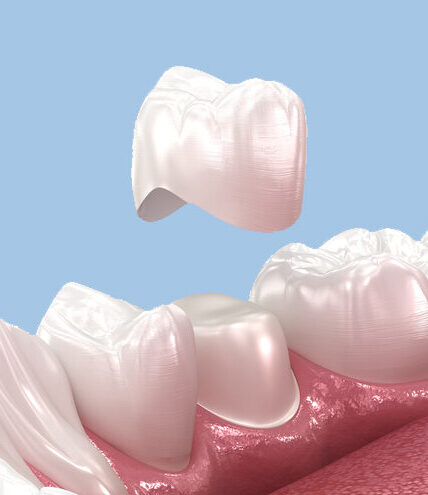
Dental crowns are excellent for teeth that need protection and restoration. A crown functions as a custom-fitted cap that covers a damaged, weakened, or compromised tooth, restoring its strength, function, and appearance. When properly placed and maintained, tooth crowns provide long-lasting protection that prevents further damage while allowing you to eat, speak, and smile with confidence. The benefits of dental crowns typically far outweigh any considerations, making them one of the most reliable solutions for preserving damaged teeth.
What exactly is a dental crown and how does it protect your tooth?
A dental crown is a tooth-shaped cap that completely covers a damaged or weakened tooth above the gum line. This restoration acts as a protective barrier that reinforces the remaining tooth structure, preventing cracks from spreading and shielding vulnerable areas from further decay or fracture.
Crowns restore your tooth’s original shape and size while returning full functionality for chewing and biting. The restoration distributes bite forces evenly across the tooth, which is particularly important when the natural tooth structure has been compromised by decay, fractures, or large fillings.
Modern dental crowns come in several materials, each offering specific advantages. Porcelain and ceramic crowns provide the most natural appearance, blending flawlessly with your existing teeth. Zirconia crowns offer exceptional strength combined with aesthetic appeal. Metal crowns, whilst less common for visible teeth, provide unmatched durability for back molars that endure heavy chewing forces.
The crown functions as both shield and structural support. It seals the tooth from bacteria that could cause further decay, whilst simultaneously holding together any weakened portions of the tooth that might otherwise crack under normal use.
When do you actually need a crown for your tooth?
You typically need a dental crown when a tooth has sustained damage too extensive for a simple filling but doesn’t require extraction. Common scenarios include severely decayed teeth where large portions of the natural structure have been lost, cracked or fractured teeth that need stabilisation, and teeth that have undergone root canal treatment and require protection.
Teeth worn down from grinding or clenching often benefit from crowns, as the restoration rebuilds the lost tooth structure and protects against further wear. Similarly, teeth with large fillings that occupy more than half the tooth may need crowns to prevent fracture, as the remaining natural tooth structure becomes increasingly fragile.
Your dentist determines whether you need a crown versus other treatments by evaluating the extent of damage, the tooth’s location, and your bite forces. A crown vs filling decision depends largely on how much healthy tooth structure remains. When more than 50% of the tooth is compromised, a crown typically provides better long-term protection than a filling alone.
Crowns also serve preventive purposes for at-risk teeth. If a tooth shows signs of significant cracking or has a large filling that’s beginning to fail, placing a crown proactively can prevent a more serious fracture that might require extraction. For patients seeking comprehensive restoration solutions, dental crowns and bridges work together to restore both damaged and missing teeth.
What are the benefits and potential drawbacks of getting a crown?
The benefits of dental crowns are substantial and long-lasting. Crowns provide exceptional durability, often lasting 10-15 years or longer with proper care. They protect weakened teeth from fracture, restore full chewing function, and can dramatically improve your tooth’s appearance. Unlike large fillings that may crack or fail over time, crowns distribute forces evenly and maintain their integrity.
Crowns offer a natural appearance that’s virtually indistinguishable from your original teeth, particularly when crafted from porcelain or ceramic materials. They allow you to eat comfortably without worrying about damaging a fragile tooth, and they prevent the need for more invasive treatments like extractions and implants.
There are some considerations to keep in mind with the crown tooth procedure. The tooth requires preparation, which involves removing a small amount of enamel to accommodate the crown. This is a permanent change, meaning the tooth will always need protection. The investment is higher than a simple filling, though the longevity typically makes crowns more cost-effective over time.
Some patients experience temporary sensitivity after crown placement, which usually resolves within a few weeks as the tooth adjusts. There may be a brief period where the crown feels slightly different, though most patients adapt quickly. For teeth requiring protection, the benefits of preserving your natural tooth with a crown far outweigh these minor considerations.
How long do dental crowns last and what affects their lifespan?
Dental crown longevity typically ranges from 10-15 years, though many well-maintained crowns last 20 years or longer. The lifespan depends on several factors working together, including the material chosen, your oral hygiene practices, and how you use your teeth daily.
Material choice significantly impacts durability. Zirconia and metal crowns tend to last longest due to their exceptional strength, whilst porcelain crowns offer excellent longevity when placed on front teeth that experience less biting force. Your dentist will recommend the most appropriate material based on the tooth’s location and function.
Your daily habits play a crucial role in crown lifespan. Excellent oral hygiene prevents decay from developing at the crown margins where it meets your natural tooth. Brushing twice daily, flossing around the crown, and attending regular dental check-ups help ensure your crown remains secure and functional.
Grinding or clenching your teeth can shorten crown lifespan by placing excessive stress on the restoration. If you grind your teeth, wearing a night guard protects both your crowns and natural teeth from premature wear. Your diet also matters—avoiding habits like chewing ice or opening packages with your teeth prevents unnecessary stress on the crown.
Regular dental maintenance allows us to monitor your crown’s condition and address any concerns before they become problems. With proper care and professional oversight, your crown can serve you reliably for decades, making it a sound investment in your oral health.
What should you expect during the crown procedure and recovery?
The crown tooth procedure typically requires two visits, though modern techniques can sometimes complete treatment in a single appointment. During your initial consultation, we examine your tooth, discuss your options, and develop a treatment plan tailored to your needs.
At the preparation appointment, we gently numb the area to ensure your comfort, then carefully shape the tooth to accommodate the crown. We take detailed impressions or digital scans that capture the precise dimensions needed for your custom crown. A temporary crown protects your tooth whilst the permanent restoration is crafted to your exact specifications.
You’ll wear the temporary crown for approximately two weeks whilst your permanent crown is created. During this time, you can eat normally with some sensible precautions—avoid very sticky or hard foods that might dislodge the temporary restoration.
At your final appointment, we remove the temporary crown, check the fit and appearance of your permanent crown, and make any necessary adjustments. Once you’re completely satisfied with how it looks and feels, we securely bond the crown to your tooth.
Recovery is typically straightforward. You may experience mild sensitivity for a few days as your tooth adjusts to the crown, though this usually resolves quickly. Most patients return to normal eating and activities immediately after the final placement.
Modern techniques make the crown procedure comfortable and efficient. We take time to ensure your crown fits perfectly, looks natural, and functions just like your original tooth. If you’re considering whether a crown is right for your tooth, we’d be happy to schedule a consultation to discuss your individual needs and answer any questions you may have about the process.
